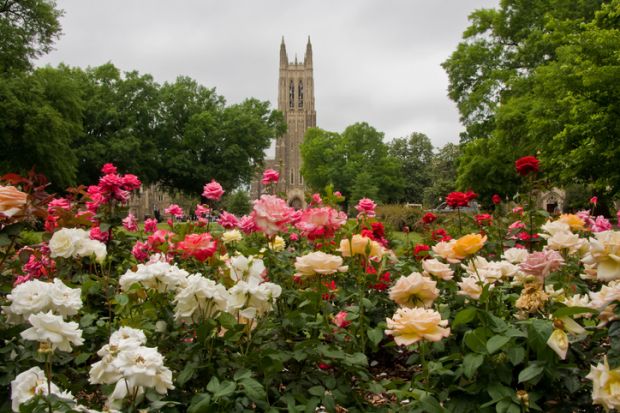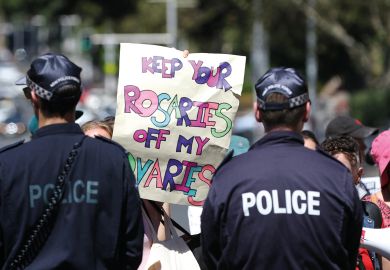Divinity schools aren’t devoid of infighting, but controversies from these centres of academic and spiritual contemplation rarely spill into the public domain. Unsurprisingly, then, recently released documents about an ongoing dispute over the role of diversity training within Duke University’s Divinity School have grabbed religious scholars’ attentions.
Here’s how it started. In February, Anathea Portier-Young, an associate professor of the Old Testament at Duke, sent an email to her colleagues within the Divinity School urging them to participate in a two-day Racial Equity Institute described as providing foundational training in understanding historical and institutional racism. It’s “a first step in a longer process of working to ensure that [the school] is an institution that is both equitable and anti-racist in its practices and culture”, she wrote.
While some professors have completed such training elsewhere in recent years, the event would be the first at the school, Portier-Young added. “Those who have participated in the training have described it as transformative, powerful and life changing. We recognize that it is a significant commitment of time; we also believe it will have great dividends for our community.”
Later that afternoon, Paul J. Griffiths, Warren Chair of Catholic Theology, responded to Portier-Young and other colleagues with a reply-all email, calling the event a “waste” and objecting to the “exhortation” to attend.
“We here at Duke Divinity have a mission. Such things as this training are at best a distraction from it and at worst inimical to it,” Griffiths wrote. “I exhort you not to attend this training. Don’t lay waste your time by doing so. It’ll be, I predict with confidence, intellectually flaccid: there’ll be bromides, clichés and amen-corner rah-rahs in plenty.”
When or “(if) it gets beyond that”, he added, “its illiberal roots and totalitarian tendencies will show. Events of this sort are definitively anti-intellectual…Our mission is to think, read, write and teach about the triune Lord of Christian confession. This is a hard thing. Each of us should be tense with the effort of it, thrumming like a tautly triple-woven steel thread with the work of it, consumed by the fire of it, ever eager for more of it. We have neither time nor resources to waste.”
According to a report in The American Conservative, which shared the emails online, several professors responded that they were looking forward to the weekend training. Elaine Heath, dean, in her own note agreed with them, saying she thought it would increase the school’s “intellectual strength, spiritual vitality and moral authority”.
Clearly referring to Griffiths, if not by name, Heath also said it’s “inappropriate and unprofessional to use mass emails to make disparaging statements – including arguments ad hominem – in order to humiliate or undermine individual colleagues or groups of colleagues with whom we disagree”.
The use of mass emails to “express racism, sexism and other forms of bigotry is offensive and unacceptable, especially in a Christian institution”, she added. “As St. Paul wrote to the church in Corinth, regardless of how exquisite our gifts are, if we do not exercise them with love, our words are just noise.”
Then Thomas Pfau, Alice Mary Baldwin Professor of English, with secondary appointments in Germanic languages and literatures and the divinity school, jumped in. He defended Griffiths against what he called “politically coercive and intellectual irresponsible” implications that he was racist based on his note.
If a professor chooses “to say in public (as Griffiths has just done) what so many are saying in private, one might at the very least want to listen to and engage their concerns, especially if one holds sharply opposed views”, Pfau wrote. “Having worked at Duke for a long time, for 26 years now, I have witnessed firsthand a dramatic increase [in] demands made on faculty time by administration-driven initiatives fundamentally unrelated to the intellectual work for which faculty were recruited by Duke.”
He added, “A seemingly endless string of surveys, memos and ‘training sessions’ is by now a familiar reality for most faculty, and it is an altogether inescapable entailment (as I well know) of chairing a department or program, serving on a hiring committee, or chairing a review.”
Pfau’s comments about increasing administrative workloads for faculty members will certainly hit a nerve; professors do now spend much more time than they used to on tasks other than teaching, research and traditional service. But many will likely object to the idea that a voluntary workshop about diversity amounts to what’s been called faculty “shadow work”.
The controversy didn’t stop there, though. In a later email obtained and published by The American Conservative, Griffiths said that he’d been the subject of two separate but related formal disciplinary processes. The first, initiated by Heath, the dean, resulted in a March letter saying he was blocked from participation in faculty and service committee meetings.
Griffiths’s offences, according to the letter, included refusing to meet with the dean to “discuss expectations for professional behavior as a faculty member and to abide by the agenda of the meeting which I have set”. Griffiths and Heath reportedly did not agree on terms of for such a meeting, and it never happened. Heath threatened further consequences for continuing not to meet with her, including loss of travel and research funds.
Heath also cited “your inappropriate behavior in faculty meetings over the past two years”. It’s unclear exactly what that means, but Griffiths in an email to colleagues referred to his past public comments about “the vocation and purpose of our school; the importance of the intellectual virtues to our common life; the place that seeking diversity among our faculty should have in that common life”, and – perhaps crucially – “the nature of racial, ethnic and gender identities, and whether there’s speech about certain topics forbidden to some among those identities”.
Portier-Young, who originally invited Griffiths to the training, allegedly brought a separate complaint to Duke’s Office for Institutional Equity, based on her interactions with him over the course of a year. Saying that he stood by his conversations with his colleagues but that he refused to defend himself against Portier-Young’s complaint, Griffiths in an email called it “illiberal, anti-intellectual and shameful” and an “attempt to constrain speech by blunt force rather than by free exchange”.
The American Conservative reported secondhand that Griffiths has resigned, effective in 2018. Griffiths did not respond to a request for comment, and Duke said he was still employed, and that it was immediately unaware of a resignation but otherwise unable to comment on a specific personnel case.
“Duke Divinity School is committed to scholarly excellence and academic freedom, which includes a commitment to diversity and inclusion,” Audrey Ward, a spokesperson, said via email. “We seek to foster an environment where diversity of opinions is respected and members of the community feel free to engage in a robust exchange of ideas on a range of issues and topics. We believe that all faculty have a right to speak out as members of a civil academic community, and if all voices are to be heard, diverse perspectives must be valued and protected.”
As part of an ongoing effort to foster and support such a community, she added, “we will continue to offer voluntary opportunities for faculty, staff and students to participate in diversity training”.
Pfau, who supported Griffiths, told Inside Higher Ed that the main problem has been his colleague’s “sometimes strident tone”, rather than his objection to the training. And Griffiths’s opposition to the training, Pfau said, was “strictly to the means chosen”, not the expressed goal of equity or diversity. Pfau also said that Griffiths is resigning – a decision arrived at “without any administrative pressure being brought to bear on him”.
Portier-Young did not respond to a request for comment.
Conversations about diversity have proved contentious at secular institutions in recent years, but they’ve also proved thorny at religious – specifically Christian – institutions; the latter, like the church itself, are arguably at a crossroads between traditional thought and practice and a more liberal Christian ethos of inclusion. Baylor University, a Baptist institution, for example, saw a new provost resign after just a semester on the job last academic year amid debate over hiring a new chief diversity officer. The provost, Edwin Trevathan, supported the plan, but some faculty members objected.
“Only in the contemporary world can we at once be unconscious of our actions and yet morally culpable for them,” one professor wrote in an online essay. “Christian schools should think long and hard about exactly what kind of diversity they wish to promote before they sign their souls over to the secular rule of diversity officers. If they don’t, they might live to regret it.”
Duke, like many other campuses, has heard students concerns about its racial climate, including from the divinity school’s Black Seminarians Union. Duke also has weathered a particular, and particularly ugly, recent controversy: allegations that an executive vice-president hit a parking attendant on campus and used a racial slur against her. The case led to a lengthy student protest.
Hans-Joerg Tiede, senior program officer for academic freedom, tenure and governance at the American Association of University Professors, said the group isn’t involved in Griffiths’s case, but that being barred from faculty meetings is a severe sanction. That kind of punishment should only be administered after a hearing before a faculty committee in which the administration has the burden of proof, he said.
John Fea, professor of chair of history at Messiah College in Pennsylvania, wrote in a post for the Way of Improvement Leads Home blog that the Duke story was more interesting than a just a battle in the culture wars, in that it's about the line “between exercising academic freedom and using such freedom to undermine the community of a Christian institution.”
“Oftentimes Christian schools use ‘community’ to stifle academic freedom or marginalize independent voices,” he wrote. “Those who approach issues from a Christian perspective or confessional commitment that might be different from the dominant Christian culture of the institution can be easily ostracized. I have seen this happen. At other times independent voices spew forth their ideas without any consideration for how they might hurt or damage the community in the process. I have seen this happen.”
Register to continue
Why register?
- Registration is free and only takes a moment
- Once registered, you can read 3 articles a month
- Sign up for our newsletter
Subscribe
Or subscribe for unlimited access to:
- Unlimited access to news, views, insights & reviews
- Digital editions
- Digital access to THE’s university and college rankings analysis
Already registered or a current subscriber? Login





